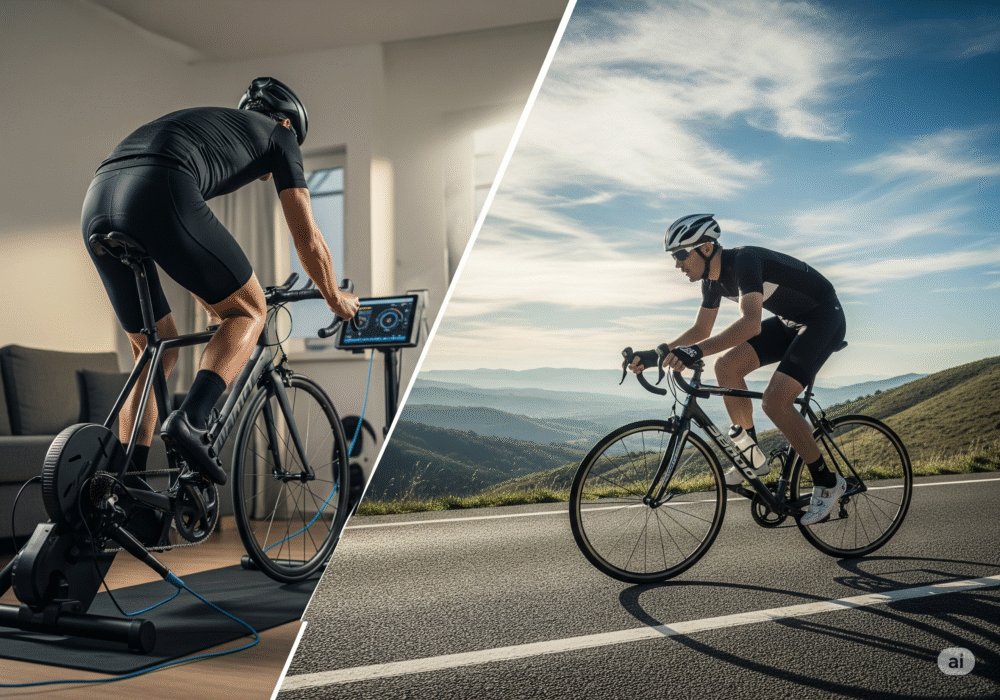Indoor vs Outdoor Cycling: What’s Better for Training?
Which terrain shapes better cyclists – your living room or the great outdoors? Let’s find out.
When it comes to cycling training, there’s one big question: Is indoor cycling as effective as riding outdoors? Or vice versa? With smart trainers, virtual races, and unpredictable weather in the mix, many cyclists are weighing the pros and cons of both styles.
At RunPlayGo, India’s premier sports and fitness brand, we help riders of all levels make smart training choices. This guide by Dr. Abhishek Raj, Senior Consultant and Unit Head of Medical Oncology as well as an Ironman Triathlon finisher, explores the unique advantages and drawbacks of indoor and outdoor cycling – helping you build a plan that works best for you.

Indoor Cycling: Focus, Convenience & Control
Indoor cycling has surged in popularity, especially with platforms like Zwift, TrainerRoad, TrainingPeaks Virtual and Wahoo SYSTM. Here’s why:
- Train Anytime: No weather, daylight, or traffic constraints.
- Highly Efficient: No coasting, stoplights, or descents – every pedal stroke counts.
- Structured Workouts: Perfect for interval training and FTP testing.
- Safer Option: Especially in urban areas with traffic or poor road conditions.
- Data-Rich Environment: Real-time power, cadence, HR, and virtual route feedback.
But it’s not all smooth spinning. Indoor cycling can feel monotonous, mentally challenging, causes saddle fatigue faster, and lacks the technical challenge of real-world terrain.
Outdoor Cycling: Nature, Skill & Real-World Fitness
Nothing beats the feeling of wind on your face and the thrill of real roads. Outdoor cycling offers:
- Varied Terrain: Hills, flats, wind, and road conditions challenge your handling skills.
- Real-World Conditioning: Builds endurance, reaction time, and bike control.
- Mental Boost: Riding in nature reduces stress and improves focus.
- Social Connection: Group rides, events, and community engagement.
- Adventure Factor: Explore new routes, destinations, and cycling culture.
The flip side? You’re at the mercy of weather, traffic, and safety risks. Training precision also takes a hit due to terrain variability.
Factor | Indoor Cycling | Outdoor Cycling |
|---|---|---|
Workout Control | High (structured intervals, consistent load) | Medium (terrain and traffic affect pace) |
Environment | Controlled, predictable | Natural, varied |
Time Efficiency | More efficient (no stops/coasting) | Less efficient (pauses, descents, etc.) |
Skill Development | Low (limited handling/bike skills) | High (corners, braking, drafting) |
Motivation | May require music or screens | Natural stimulus and scenery |
Social Element | Online group rides | In-person rides, events, clubs |
Weather Impact | None | High |
Why Not Ride Both Worlds?
Indoor vs outdoor cycling isn’t a competition – it’s a complementary training strategy. While indoor rides offer precision and control, outdoor rides deliver real-world challenges and adventure.
Smart cyclists leverage both. Use indoor workouts to build specific fitness and outdoor rides to apply it. Whether you’re prepping for a century ride, getting back in shape, or just staying consistent, alternating between the two keeps training effective – and fun.
At RunPlayGo, we bring together the tools, tech, and tips you need –from smart trainers and cadence sensors to expert blogs and gear. Whatever your cycling style, we’re here to support your ride.
Train smart. Ride free. Find your balance.

